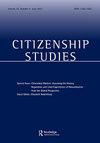是什么让民主公民权变得民主?
IF 1.9
3区 社会学
Q3 POLITICAL SCIENCE
引用次数: 0
摘要
我认为,议会代议制民主背叛了民主公民权的民主性——它的直接性。我研究这种背叛,是为了思考是什么使民主公民权民主,什么是直接民主的直接,以及它如何为民主(再)民主化提供一种手段。为此,我探讨了亚里士多德在《政治学》中提出的关于公民身份的难题。几千年来,理论家们一直利用亚里士多德对民主的厌恶和相关的错误陈述,认为直接民主在大国是不可能实现的。此外,他提出的问题从那时起就搅动了政治理论,因为它们确立了两个问题,表明民主对公民的困扰有多么深刻。第一个问题是,即使大多数人将其公民身份的政治权力委托给他人,对“人民”来说,保持主权意味着什么。第二个问题涉及民主通过破坏根深蒂固的权力和合法化的不平等来改变政治的历史能力。如果是这样,民主必须以某种方式将破坏制度化,作为一种保持活力的资源。我考察了主权、平等和破坏的挑衅是如何使公民民主化的。这些问题在民主国家是无法解决的。正如雅典民主所显示的那样,他们之间的紧张关系对于动员民主化是必要的。解决这些问题的尝试——比如共和代议制民主——会破坏其活力。本文章由计算机程序翻译,如有差异,请以英文原文为准。
What makes democratic citizenship democratic?
ABSTRACT I contend that parliamentary representative democracy betrays what must be democratic about democratic citizenship – its directness. I examine this betrayal to consider what makes democratic citizenship democratic, what is direct about direct democracy, and how it may provide a means to (re)democratize democracy. To do so, I engage the conundrums about citizenship Aristotle posed in the Politics. For millennia, theorists have used Aristotle’s dislike of democracy and related misrepresentations to dismiss direct democracy as impossible for large states. Moreover, the problems he raised have roiled political theory ever since because they established two issues that indicate how profoundly democracy troubles citizenship. The first concerns what it means for “the people” to remain sovereign even when most delegate the political powers of their citizenship to others. The second concerns the historical capacity of democracy to transform the political by disrupting entrenched power and legalized inequality. If so, democracy must somehow institutionalize disruption as a resource to keep it vigorous. I examine how the provocations of sovereignty, equality, and disruption democratize citizenship. These problems are unresolvable in a democracy. Their tensions are necessary to mobilize democratization, as Athenian democracy shows. Attempts to resolve them – such as republican representative democracy – destroy its energies.
求助全文
通过发布文献求助,成功后即可免费获取论文全文。
去求助
来源期刊

Citizenship Studies
POLITICAL SCIENCE-
CiteScore
3.60
自引率
11.10%
发文量
85
期刊介绍:
Citizenship Studies publishes internationally recognised scholarly work on contemporary issues in citizenship, human rights and democratic processes from an interdisciplinary perspective covering the fields of politics, sociology, history and cultural studies. It seeks to lead an international debate on the academic analysis of citizenship, and also aims to cross the division between internal and academic and external public debate. The journal focuses on debates that move beyond conventional notions of citizenship, and treats citizenship as a strategic concept that is central in the analysis of identity, participation, empowerment, human rights and the public interest.
 求助内容:
求助内容: 应助结果提醒方式:
应助结果提醒方式:


